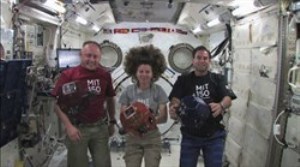Jul 4 2014
The Zero Robotics Middle School Program has come to Texas for the first time with the help of Dr. Greg Chamitoff, Professor of Practice in the Department of Aerospace Engineering, Johannes Strobel, Director of Educational Outreach Programs with the Texas A&M Engineering Experiment Station and the Dwight Look College of Engineering.
The Zero Robotics Middle School Summer Program is a five-week STEM (science, technology, engineering and math) curriculum that introduces students to computer programming, robotics, and space engineering, and provides hands-on experience programming. Zero Robotics builds critical engineering skills, including problem solving, the design thought process, operations training, and teamwork. It connects students with prominent scientists and encourages them to pursue careers in the fields of science, technology, engineering and/or math.

The program runs June 9 through July 14, with the finals occurring in mid-August. Directing the program are Dr. Dave Hyland, Professor in the Department of Aerospace Engineering, and Dr. Joseph Morgan, Professor in the Department of Engineering Technology and Industrial Distribution. Katharine Leysath is the program manager, and five Texas A&M students from the Dwight Look College of Engineering are mentoring the five middle school teams.
Zero Robotics is a programming competition where the robots are SPHERES (Synchronized Position Hold Engage and Reorient Experimental Satellites) inside the International Space Station. The competition starts online where teams program the SPHERES to solve an annual challenge. After several phases of virtual competition in a simulation environment that mimics the real SPHERES, finalists are selected to compete in a live championship aboard the ISS. An astronaut will conduct the championship competition in microgravity with a live broadcast.
Student participants compete to win a technically challenging game by programming their strategies into the SPHERES. Each year’s game is motivated by a problem of interest to Defense Advanced Research Projects Agency (DARPA), National Aeronautics and Space Administration (NASA), and Massachusetts Institute of Technology (MIT). Students’ programs control the satellites' speed, rotation, and direction of travel. The students program their satellites to complete competition objectives, for example, navigating obstacles, while conserving resources such as fuel. The programs are autonomous - that is, the students are not able to directly control the satellites while they are running.
The middle school students create, edit, save, and simulate projects online. They use a graphical editor to write code, then simulate their programs immediately and see the results using a simulation. The programming interface and simulation are entirely web-based, so Zero Robotics does not require any software downloads or computer configuration. The system even allows teams to compete against themselves and against pre-designed standard players, so that they can test different strategies before finalizing their competition submissions.
Dr. Greg Chamitoff worked with the Zero Robotics program during his time as an astronaut at NASA. He says, “NASA has called Zero Robotics one of its most successful STEM outreach programs of all time, and it has already inspired thousands of students across the country. We are very excited about getting students from Texas involved too. Besides learning a great deal about Space exploration and robotics, they’ll have a live link up with the crew onboard the Space Station. The whole experience is a lot of fun.”
Zero Robotics seeks to inspire the next generation of great minds by allowing them unprecedented access to space at the high school and middle school level. By making the benefits and resources of the space program tangible to students, Zero Robotics hopes to cultivate an appreciation of science, technology, engineering and math through healthy, immersive, collaborative competition. Another major goal of Zero Robotics is to lead young minds to see the concept of working in space as "normal", allowing imaginations to go beyond the boundaries of rocket science.
Due to the complexities of programming in space within the context of a middle school program, the 2014 Middle School Summer Program is by invitation only. The schools participating from Texas are Home Educators Around Texoma/Wichita County 4-H from Wichita Falls, Aldine Middle School from Houston, Keating Middle School and Four Points Middle School from Austin, and Middle School Teen Program from Fort Sam Houston in San Antonio.
Zero Robotics Middle School Summer Program is provided through a partnership between the MIT Space Systems Lab and the Massachusetts Afterschool Partnership (MAP) with support from Aurora Flight Sciences and TopCoder. Zero Robotics is sponsored by NASA, the Defense Advanced Research Projects Agency (DARPA), and the Center for the Advancement of Science in Space (CASIS).